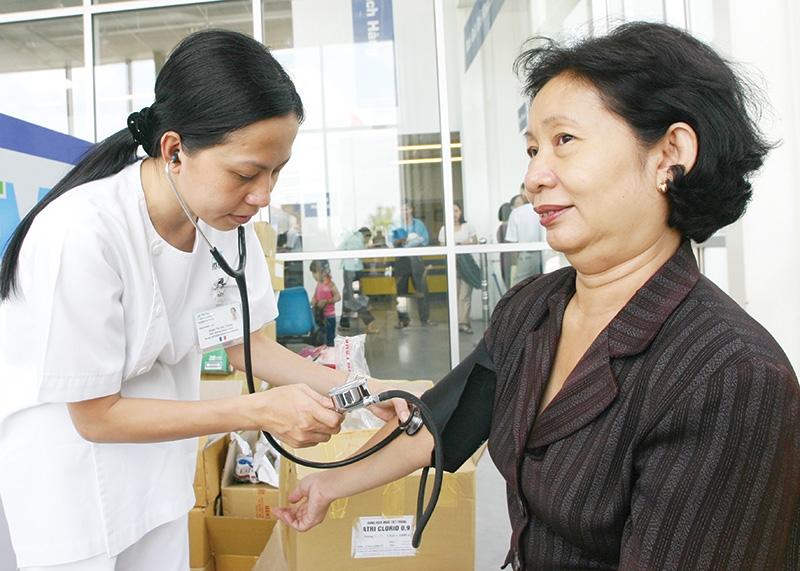Collaboration is the key for healthcare progress
 |
| Roeland Roelofs, country president at Novartis Vietnam |
Roeland Roelofs, country president at Novartis Vietnam and chief representative of the NPhS R.O, discussed how important new PPP models across a bigger range of stakeholders are to help build a healthier Vietnam.
The question I keep asking myself after visiting community health stations, districts, provincial, and central-level hospitals across Vietnam is what can be done? The problem is clear: higher-level hospitals which should be caring for more severe cases are overwhelmed by patients, many of whom should be managed in primary care. How can Novartis help people access healthcare at lower-level facilities?
The challenge is complex. The stakeholders are many. The specific contribution my company will make may not be straightforward. Yet, my answer today is that the Vietnamese government is well placed to partner with the private sector, development partners, civic society, and academia to transform primary healthcare in Vietnam, starting now.
Disease patterns are changing, with chronic illnesses accounting for three quarters of deaths, while infectious diseases have not yet fully disappeared. Nine out of 10 people in Vietnam have health insurance, but coverage does not necessarily translate into access to all the required health services close to home. At the same time, the Vietnamese government has made impressive progress in the last two decades in improving health for all its citizens. The government has committed to ensuring that every citizen has access to high-quality primary healthcare services, essential to improve care for non-communicable diseases, through achieving universal healthcare by 2030. This means investments in prevention, promoting healthy behaviours and improving the range and quality of services offered at the community level. The agenda is bold and ambitious, as it needs to be, to deliver the expected population health gains.
 |
| The challenge is to ensure people have suitable coverage, Photo: Le Toan |
I am excited about contributing to this agenda now. Vietnam’s economy is growing rapidly. The Ministry of Health (MoH) is about to create the Working Group for Primary Healthcare Transformation, which will act as an umbrella for all the stakeholders who want to contribute to this task. I am convinced that Vietnam’s ability to continue its economic growth over the longer term will be dependent on the success of this initiative.
Novartis is actively exploring several areas to contribute in, including education and engagement programmes to increase adoption of health-seeking behaviours as well as strengthening links between community health stations, districts, and provincial level hospitals to achieve coordinated diagnosis, referral, and treatment, for example in cardiovascular and heart disease. Our teams have ample experience in both areas, for instance through the Novartis Social Business Healthy Family programme that has been running in Vietnam for six years, reaching over 1.1 million people and involving more than 1,900 community health stations.
We also realise that the contribution we are making is not enough. We invite others, specifically domestic and international private sector partners, to bring their capabilities, resources, and expertise to the working group. The World Economic Forum and the Harvard Medical School Center for Primary Care have already committed, but we need to broaden this coalition. As David Duong from Harvard Medical School noted, we have to create new models of engagement across a bigger range of stakeholders, all working towards achieving universal healthcare by 2030, for the programme to be successful.
I believe that this model could very well become an example that many countries in the region – or perhaps even across the globe – will want to follow. According to my colleague Deborah Gildea, responsible for Novartis Social Business in Asia, many public-private partnerships in the region consist of governments outsourcing services or infrastructure creation to the private sector – for instance, building a new hospital or clinic. By contrast in Vietnam, she said, the MoH is offering the private sector a real partnership with tangible input into and co-ownership of the transformation of primary healthcare.
The time to step up and complement the government’s efforts in primary care is now. Which domestic and international companies will join us?
What the stars mean:
★ Poor ★ ★ Promising ★★★ Good ★★★★ Very good ★★★★★ Exceptional
Related Contents
Latest News
More News
- State corporations poised to drive 2026 growth (February 03, 2026 | 13:58)
- Why high-tech talent will define Vietnam’s growth (February 02, 2026 | 10:47)
- FMCG resilience amid varying storms (February 02, 2026 | 10:00)
- Customs reforms strengthen business confidence, support trade growth (February 01, 2026 | 08:20)
- Vietnam and US to launch sixth trade negotiation round (January 30, 2026 | 15:19)
- Digital publishing emerges as key growth driver in Vietnam (January 30, 2026 | 10:59)
- EVN signs key contract for Tri An hydropower expansion (January 30, 2026 | 10:57)
- Vietnam to lead trade growth in ASEAN (January 29, 2026 | 15:08)
- Carlsberg Vietnam delivers Lunar New Year support in central region (January 28, 2026 | 17:19)
- TikTok penalised $35,000 in Vietnam for consumer protection violations (January 28, 2026 | 17:15)

 Tag:
Tag:




















 Mobile Version
Mobile Version